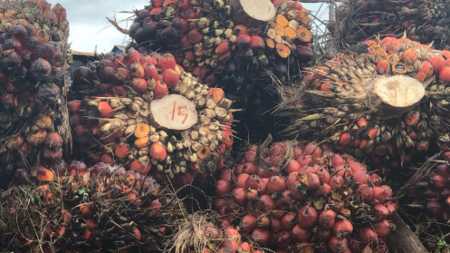Building an ethical oil palm supply chain in Ghana
2 July 2021
The farther away a business is from its raw materials, the harder it can be to determine if its supply chain is linked to deforestation, ecosystem conversion, or human rights violations. Despite being closer to the source, however, producers may still face similar hurdles, even when their operations are certified.

By Sofia Perez
The farther away a business is from its raw materials, the harder it can be to determine if its supply chain is linked to deforestation, ecosystem conversion, or human rights violations. Despite being closer to the source, however, producers may still face similar hurdles, even when their operations are certified.
Beyond managing the certified volumes produced on their own plantations, some producing companies also obtain significant commodity volumes from independent smallholders and other external sources outside of their direct holdings. As a result, these producing companies need additional mechanisms to ascertain that the non-certified production they source is consistent with their supply chain commitments, as well as the demands of their buyers and consuming markets further downstream.
This is exactly the situation facing BOPP (Benso Oil Palm Plantation), which grows oil palm in western Ghana and processes the fresh fruit bunches into crude palm oil and palm kernel oil. As a company certified by the Roundtable on Sustainable Palm Oil (RSPO), BOPP’s owned plantations operate in accordance with the RSPO’s principles and criteria. However, about 30% of the oil-palm fruit BOPP processes is purchased from non-certified smallholders that operate outside of its plantations. To support management of both their certified and non-certified supply, the Accountability Framework initiative (AFi) has offered additional tools and approaches to further strengthen existing efforts to minimize the risk of deforestation, ecosystem conversion, and violations of workers’ rights and community land rights within its wider supply chain.
Toward this goal, BOPP began working with Proforest—an AFi coalition member—to help apply the Accountability Framework’s guidance for achieving ethical supply chains. This support included a review of BOPP’s commitments and policies, supplier alignment with these policies, key aspects of monitoring, verification, and reporting, and the establishment of systems for managing supplier non-compliance.
The process began with benchmarking BOPP’s commitments around human rights, deforestation, and the conversion of other natural ecosystems. First, the company used the Accountability Framework’s self-assessment tool to see how well its existing policies and systems aligned with the Framework’s established global norms. Next, Proforest worked with BOPP’s staff, conducting an on-site assessment to validate the company’s results and a gap analysis to indicate areas that needed additional attention. The gap analysis included a mapping of independent smallholders and other indirect suppliers and agents from whom BOPP purchases oil-palm fruit, in a highly competitive landscape.
BOPP already had policies in place to address issues such as workers’ rights and deforestation, as well as commitments around identifying, maintaining, and protecting HCV areas and culturally important lands prior to any new development. Thanks to its RSPO certification, the company also had good implementation and reporting systems in place, mainly focused on its own operations and on the RSPO-certified smallholders in its supply chain. The gap analysis identified a few areas where BOPP could align with the Framework, including around commitment scope and definitions as well as opportunities to follow AFi’s reporting guidance to better capture the company’s progress toward the fulfilment of its commitments.
With this analysis in hand, Proforest and BOPP developed an action plan to more closely align with the Accountability Framework. BOPP is working to close the gaps through use of the Framework’s definitions, addressing conversion in its policies, specifying time-bound, quantitative, and geographically specific targets and milestones for each commitment, and improving its reporting mechanisms. “Implementing the Framework provides the opportunity to reinforce and fine-tune our existing sustainability standards,” says Kwasi Baah Ofori, BOPP’s estate manager. “The process challenged the team to improve on its documentation while aligning to best practices recommended by the AFi.”
The biggest challenge is how BOPP will extend its policies, traceability, and implementation systems to cover independent smallholders. It takes dedication and effort to engage each of these suppliers, especially in such an intensely competitive landscape. Many of these smallholder suppliers required additional training to implement some of BOPP’s policies, and with so many potential buyers available to them, suppliers could simply choose to sell their fruit to a different buyer with less stringent ethical supply chain commitments. Therefore, it’s vital for BOPP and its peers to engage in pre-competitive collaboration while simultaneously supporting smallholders as they build their capacity to address social and environmental issues in their operations.
To address this, BOPP is working directly with smallholders, providing them with training to improve productivity and build their capacity to comply with the company’s policies and supplier requirements, as well as implementing a robust monitoring system to ensure that third-party suppliers meet all of the company’s sustainability commitments. While BOPP already uses geo-referencing to assess the integrity of forests and other ecosystems in its own operations, it will extend the technology’s use to cover independent smallholders. BOPP is also setting new criteria for retaining, suspending, or excluding non-compliant suppliers.
“It is important to establish key performance indicators and effective monitoring systems to ensure that smallholders meet requirements,” says Proforest’s Nana Darko Cobina, who has been helping the company make these changes. “Equally important, however, is for smallholders to be actively supported through training and capacity building, and these are areas where BOPP is making great progress.” BOPP plans to continue working on the implementation of this action plan throughout the remainder of 2021 and—together with Proforest and the AFi’s regional coalition in West Africa—will share lessons learned to help other companies improve how they approach the management of certified and non-certified volumes in their supply chains.
If you would like to receive updates, you can subscribe to our mailing list here.
